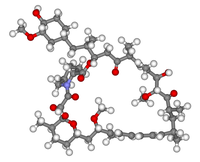
Photo from wikipedia
311 Background: Both oxidative stress and inflammation play important roles in prostate cancer cell apoptosis or proliferation. However, the mechanisms underlying these processes remain unclear. Thus, we chose IL-8 as… Click to show full abstract
311 Background: Both oxidative stress and inflammation play important roles in prostate cancer cell apoptosis or proliferation. However, the mechanisms underlying these processes remain unclear. Thus, we chose IL-8 as the bridge between inflammation and cancer cell oxidative stress-induced death and confirmed its connection with mTOR and GSK-3beta. Methods: We overexpressed GSK-3beta and observed the effect of GSK-3beta on reactive oxygen species (ROS) and cell death induced by oxidative stress. Then, IL-8 was upregulated or downregulated to determine its impact on preventing cells from damage by GSK-3beta-induced oxidative stress. In addition, we confirmed the role of mTOR in this process through its overexpression or knockdown. Real-time PCR, Western blotting, transcription, Cell Counting Kit 8, flow cytometry and other techniques were used. Results: IL-8 promotes prostate cancer cell proliferation and decreases apoptosis, while GSK-3beta induces cell death by oxidative stress through the activation of the caspase-3 signaling pathway by increasing ROS. In addition, mTOR can also decrease the activation of the caspase-3 signaling pathway by inhibiting GSK--3beta and thus decreasing ROS production. Moreover, the inhibitory effect of IL-8 on GSK-3beta occurs through the regulation of mTOR. Conclusions: The results of this study highlight the importance of GSK-3beta, which increases the production of ROS and then induces oxidative stress in tumor cells, while IL-8 and mTOR attenuate the oxidative stress to protect prostate cancer cells through the inhibitor GSK-3beta.
Journal Title: Journal of Clinical Oncology
Year Published: 2019
Link to full text (if available)
Share on Social Media: Sign Up to like & get
recommendations!